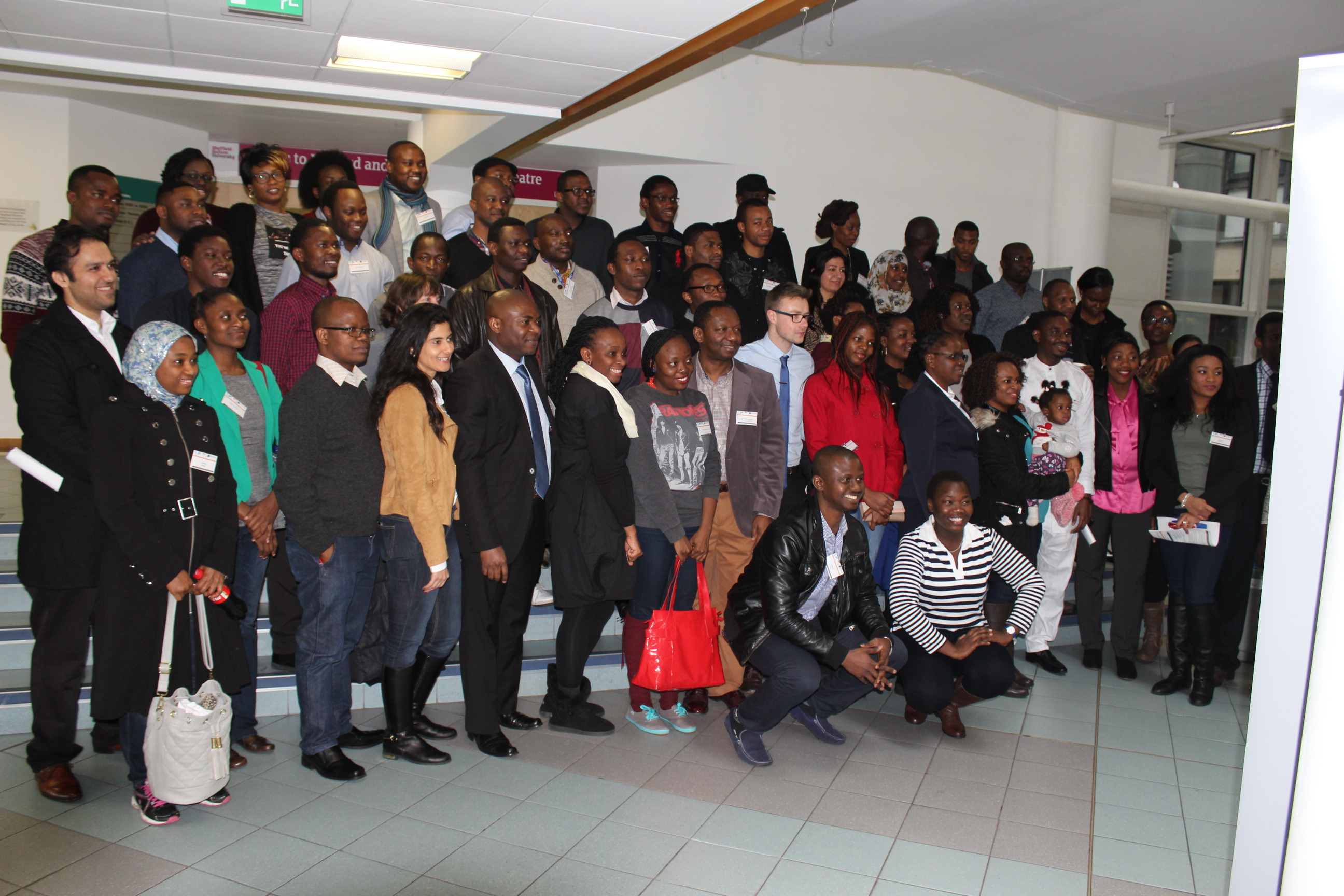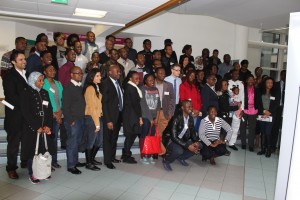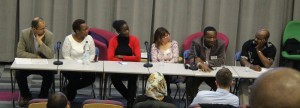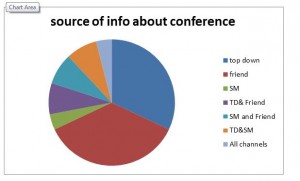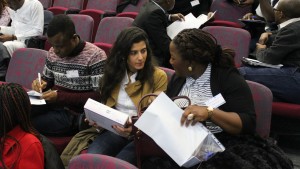By Herine Otieno
On 6th of February, I (with the support of fellow commonwealth scholars in SHU and Sheffield University) hosted a conference whose focus was: ‘State of Research and Postgraduate Research training in Africa’. The conference was through a generous sponsorship by the SHU University, through the D& S Faculty. I must say, that the SHU support was very comprehensive; it covered the snacks and lunch, the venue, the transport for the three keynote speakers, the venue and elaborate IT support for the day which amongst other things allowed for virtual participation by participants from four locations in East Africa (two of them being universities).
The feedback from the participants after the conference, the post conference discussions that I have had with some of the conference participants including academic staff indicate that the conference was a huge success: not just in terms of organization but most importantly in achieving its main objective which was to raise the critical awareness on the state of research and postgraduate research training in Africa and to bring the participants, (many who by design were emerging African scholars in the UK) to the realization that we, as emerging African scholars working together as a collective with other African scholars from and across Africa can make a positive contribution to shaping the research agenda in Africa.
Indeed the discussions ensuing the first presentations by current PhD scholars in the state of postgraduate research training in different regions in Africa and those during the plenary session after the three keynote speeches indicated not only an increased level of conscientisation but also a definite outlook towards transformation which we all realized could only be sustained by an interrogation with a view of changing the current internal values, beliefs and mind-sets amongst current African scholars both within Africa and in the diaspora. The general feeling by the participants at the end of the conference can be summed up by the following statement made by one of the key participants, Prof. Dilly Anumba of Sheffield University, two weeks after the conference: ‘I feel so inspired and so motivated…to reach out and want to make a difference in Africa in as far as state of research is concerned…’.
So what contributed to the remarkable success of the conference? I would say this question would elicit different answers from different angles… I have written another reflective piece titled… The State of Research and Postgraduate Research Training in Africa conference…it’s making…and ‘after’ thoughts… this can be found on my blog; https://amstref.wordpress.com/. I will however attempt to share briefly on what made this conference hold…
First and foremost, a high level of conviction in terms of the value, short term and/or long term vision for the conference is important. While it may not be possible to achieve this with all the supporting team members it is vital for at least the originator of the idea or the organizing team lead. This is important because at the end of the day organizing a conference means sacrificing not just one’s precious time of the PhD ‘readings’ but may also mean investing some ‘pounds’ indirectly …In my case I had quite a number of discussions around the conference focus with a number of established academic African scholars across the UK and this meant quite some expenditure in terms of transport. I also had to acquire a zoom account to ensure I could have uninterrupted meetings with my support organising team members in East Africa and allow for the video conferencing. Again how much one would be willing to sacrifice resources (time or otherwise) I believe is positively correlated with one’s level of conviction of the value of the conference to their development as PhD student. Needless to say, that with careful and strategic thought, the gains from the conference in terms of one’s professional development is also positively linked to the level of sacrifice and ‘investment’ in the conference.
It helps to have some very immediate gains or connections; a good example is the fact that shaping one of my presentations for the conference involved scanning through all mathematics education (East Africa) journal articles published in the last 25 years. This process amongst other things enabled me to identify some literature from my first chapter but also helped enhance my general grip of what has been done so far in East Africa as far as mathematics education research is concerned.
Further, the final paper presented will form a basis of presentations I intend to make in future relevant conferences: I have for example recently secured some support from Africa Institute of Mathematics(AIMS) to participate(and share some of my findings ) in a conference in Dakar Senegal from 7th and 10th of March which will bring together top STEM professionals in Africa: I secured the offer for the support by showcasing amongst other things my past and present interest in matters related to research and STEM in Africa and the hosting of the conference was top on my list of examples – given that it is most recent.
I am also working towards presenting a paper to share on some of the thoughts from the conference at a conference bringing together the Executive heads of Association of Commonwealth Universities, in Ghana later in the year(if accepted…). I must also point out that the ideas that I gathered from the participants during the brainstorming session will go a long way in helping shape the two interventions (establishing a student led network of emerging African scholars and a publishing a citizen friendly research journal(the Mwananchi research journal…) show casing current research on Africa/ and by Africa’s researchers..) which I hope to work in the future through my foundation; Africa Mathscience Technology Research and Education Foundation (AMSTREF).
Back to the planning of the conference, a first key step is for the originator to articulate their thoughts about the conference with a view of bringing people to co-own their vision for the conference. The first target would be one’s supervisors. In my case, my supervisors helped me think through my objectives for the conference, directed my thoughts in terms of who I could approach as keynote speakers and later as the day approached helped me figure out a lot of the logistical aspects related to hosting a conference. The next key persons to convict were the keynote speakers. Until one gets one or more keynote speakers on board, the conference remains a theory. Having the speakers on board on the other hand allows one to move forward in terms of general publicizing of the event. One’s network built before and during the ongoing PhD process is a good place to start from, in trying to get keynote speakers. Networks are also important in getting the word out there about the conference
One should also tap into the established university structures to get the word out about the conference. In my case the doctoral school sent out mails to all doctoral students informing them about the conference. They also put the conference flier on the school’s blog. This went a long way in raising the profile of the conference especially when trying to interest external participants/institutions. I was also able to send emails to the various postgraduate course directors requesting them to share the flier with the Master’s students. The SHU student union in my opinion was not as helpful as I had initially expected. On the other hand I was humbled by support by the Student related bodies in Sheffield University; their international student for instance shared the conference flier with all their international students through email, something that was untenable at SHU. Also helpful were independent student associations, like country based associations whose influence spanned across the two universities in Sheffield.
Social media was also handy in passing on the information: Facebook, WhatsApp and blogging topped the list; twitter, through the hashtag #research4africa, was useful in helping push the conversation during the conference. The analysis below of a sample of participant’s feedback on how they got to know about the conference gives every indication that word of reference from friends or through a top down email (university or a membership association) is a powerful means of interesting students/other persons in attending the conference.
Having a team to work with is an invaluable necessity in organizing a conference: In my case a had two sets of teams; one was made of fellow commonwealth scholars in from Sheffield and the other were teams from Uganda and Kenya who did not only help in organizing for the video streaming but also contributed a lot in shaping the agenda and framework of the meeting. I will say that who joins the team and how much they participate is a function of a number of factors including; one’s ability to articulate the vision of the conference and portray a level of competency in organizing the conference; the individual members interests and level of connection in terms of past relationship or being part of some common cause/group. The team leader should realize though that at the end of the day the buck stops with him or her and that the individual team members’ participation and level of interest may wane or grow over the planning time. Looking back, this is one of the areas that I think I will improve on the next time I host a conference: I will try and engage the team members earlier to allow for adequate time for most of them to internalize the vision and various components of the conference.
Notably, I did not figure out everything in terms of the general framework of the conference right at the beginning a lot of things evolved over time: It is important that one keeps mulling over the conference, sometimes bouncing it off persons with probably more experience in some aspects from diverse fields: The final shape of the conference in terms of the flow and some of the strategic activities like brainstorming session came up as a result of sharing about the conference with others. My reflections from readings on research paradigms for example were also helpful in locating my conference objectives within the critical paradigm thereby helping shape the conference reflection manual which helped shape the conversations during the conference.
Finally, the help from the department through my course administrator in terms of logistics and from student colleagues through simple gestures like helping with the printing when I forgot my student card at home or helping carrying things to the conference venue, or just giving me a warm hug to cheer me on…are all part of the key bolts and nuts that contributed to the conference success.
I have attempted to send thank you notes to all these people after the conference, I know I have not covered them all; I have just realized for example, that I forgot to say a big thank you to Prof. Lisa Hopkins for giving the first very important nod to the conference! Hoping that this article will be widely circulated, may I correct this anomaly by ending this narration with a humble thank you… to all who contributed in one way or another to the success of the conference… …Ahsanteni sana! (Thank you very much).
NB: a website; www.amstref.org will officially go on air by end of March 2016 and it will have postings on post conference related activities. Highlights of these will also be posted on my blog…https://amstref.wordpress.com/ .
